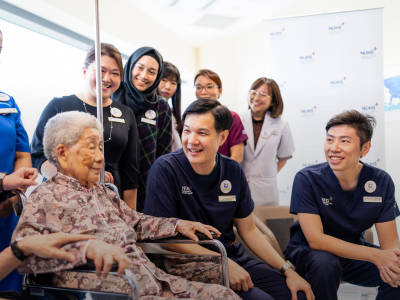Published on 3 May 2023
Unlike traditional stem cell transplants, the Haplo-2017 protocol does not require full-matched donors, thus allowing patients to receive treatment earlier.
The future looked bleak for Madam Cynthia Tan when she was diagnosed with high-risk acute myeloid leukaemia in October 2019.
Due to the cancer, the 59-year-old had to stop working, and could no longer continue her hobby of running in the park.
While Mdm Tan’s condition improved after undergoing three cycles of chemotherapy, there remained a high chance of her cancer relapsing – the most effective way to prevent that from happening was for her to undergo a stem cell transplant.
Blood stem cell transplantation is also the only curative treatment for various types of blood cancers and bone marrow disorders, including leukaemia, myelodysplastic syndrome, and lymphoma.
Conventionally, blood stem cell transplantation requires a donor to have human leukocyte antigen (HLA) markers that fully match the patient’s, so as to lower the risk of transplant-related complications.
However, finding a full-matched donor is easier said than done. Siblings have a one in four chance of being a match with the patient, while parents and children will always have half-matched HLA markers. On average, only three in 10 patients would be able to secure a full-matched donor within the family, while the remaining 70% would have to rely on an unrelated volunteer donor from local or international registries.
The difficulty of finding a full-matched donor is amplified for ethnic minorities – their population is smaller, and there is generally a lack of minority participation in most of the registries.
Unfortunately for Mdm Tan, neither her family members, nor the local and international donor registries, turned up a suitable full-matched donor.
As such, she decided to go for a haploidentical (non-full matched) stem cell transplant – a novel cell-selection technique for blood stem cell transplant that was developed by a team of haematologists from the National University Cancer Institute, Singapore (NCIS), together with clinicians from other local healthcare institutions.
Known as the ‘Haplo-2017 protocol’, the technique not only makes haploidentical transplant a feasible treatment option for nearly all blood cancer patients, but also reduces transplant-related complications, such as transplant rejection and infections.
Mdm Tan is one of more than 100 patients who have been treated with the method since 2017 - she underwent the procedure in March 2020 with her 25-year-old son, Mr Keith Chan, as the half-matched donor for the transplant.
One of the instrumental figures in developing the Haplo-2017 protocol is Associate Professor Koh Liang Piu, Senior Consultant at the Department of Haematology-Oncology at NCIS and Clinical Director of the NCIS Adult Haematopoietic Cell Transplant programme.

A/Prof Koh explained that the Haplo-2017 protocol will allow patients with blood cancers – which are among the 10 most frequent cancers in men and women in Singapore – to receive early treatment.
“For blood cancers such as acute leukaemia, time is of the essence,” A/Prof Koh explained. “Early treatment often gives rise to better outcomes and any delay often results in disease progression and complications.
“Advances in the field have greatly improved treatment where patients can still receive successful stem cell transplants without full-matched donors. Haploidentical blood stem cell transplant can be an option if no perfectly HLA-matched donor is found in a timely manner.”
The Haplo-2017 protocol harvests and retains only non-harmful stem cells from the donor, while those that are known to cause rejections are removed. In addition, stem cells that can boost the patient’s immunity are also infused. This lowers the risk of life-threatening infections.
About 70% of the patients who went for haploidentical blood stem cell transplants have since displayed favourable outcomes. This includes showing no more signs of cancer, and not experiencing transplant-related complications such as rejection. In addition, patients also did not need to be on immunosuppressants – which are known to cause side effects – post-treatment.
“Since introducing the haploidentical blood stem cell transplant programme at NCIS in 2017, we have treated about 50 patients and the outcomes have been comparable to full-matched donor blood stem cell transplants,” said A/Prof Koh.
“There is now good data in Singapore to show that haploidentical blood stem cell transplant is a viable treatment option for blood cancers, such as leukaemia and lymphoma, and many other bone marrow disorders.
“Most importantly, with the Haplo-2017 protocol, nearly all patients will be eligible for a haploidentical stem cell transplant as almost everyone has a potential half-matched donor in their family.”
Researchers are currently working on refining the protocol to get better outcomes.
As for Madam Tan, she remains well and continues to be in remission without having to rely on immunosuppressants. She has also returned to work, and can now run in the park once again.
In consultation with A/Prof Koh Liang Piu, Senior Consultant, Department of Haematology- Oncology, NCIS



